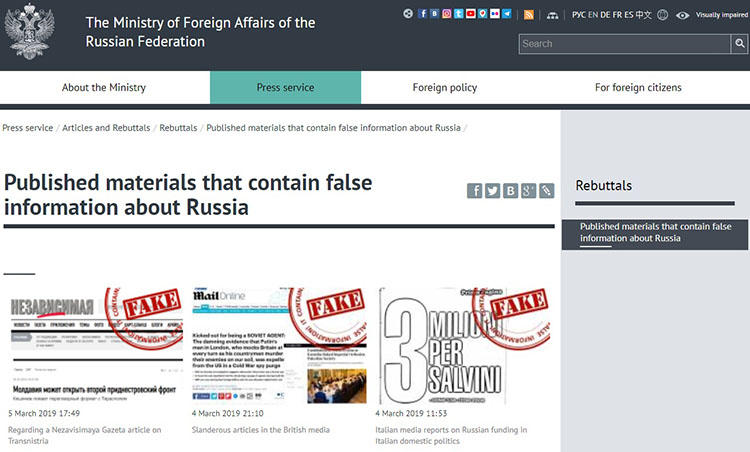New York, March 7, 2019–The Committee to Protect Journalist today called on Russia to drop proposed legislation advanced in the country’s parliament that would allow courts to jail and fine people who use the internet to spread “fake news” or disrespect government officials and state symbols, including President Vladimir Putin. The bills would also allow Russian authorities to block websites that publish the offending material.
“We are extremely troubled by the legislation that cleared Russia’s State Duma today, which is clearly aimed at tightening state control over independent media and intimidating journalists into self-censorship, and call on the upper house to amend or block it,” said CPJ Europe and Central Asia program coordinator Gulnoza Said. “Among the most alarming factors is the idea that journalists could be criminally punished for criticizing public officials, which is at the very heart of their job to hold the powerful to account.”
Repressive governments around the world utilize laws and rhetoric about “fake news” to delegitimize independent and critical reporting, according to CPJ research.
Deputies in Russia’s powerful State Duma, the lower chamber of parliament, today passed the bill on “fake news” in its third reading with 322 votes in favor and 78 opposed, according to independent news website Meduza.
The Duma passed the bill on penalizing those who disrespect authorities, state symbols, or Russian society by a vote of 327-40, with one lawmaker abstaining, the U.S.-funded Radio Free Europe/Radio Liberty (RFE/RL) reported on its website. The votes were broadcast live on the parliament’s official site.
For the bills to become law, they must be approved by the parliament’s less powerful upper chamber, the Federation Council, and then signed by Putin.
Under the proposed laws, CNN’s Moscow bureau reported, people found guilty of publishing “indecent” posts online that demonstrate “disrespect for society, the state, [and] state symbols of the Russian Federation” or for government officials would face up to 15 days in administrative detention. Individuals, including journalists, who post “fake news” could be hit with fines of up to 100,000 rubles (more than $1,500), while fines for public officials may reach up to 200,000 rubles (more than $3,000), and companies could be penalized as much as 500,000 rubles (about $7,600), RFE/RL reported.
The legislation would allow the state-run media watchdog Roskomnadzor to determine what constitutes “fake news,” RFE/RL reported. According to CNN , the bill defines “fake news” as any unverified information that “threatens someone’s life and (or) their health or property, or threatens mass public disorder or danger, or threatens to interfere or disrupt vital infrastructure, transport or social services, credit organizations, or energy, industrial, or communications facilities.”
The bill also obliges internet service providers to block access to content that “offends human dignity and public morality,” CNN reported. According to RFE/RL, the bill states that publications officially registered with Roskomnadzor, including online news outlets, will be given a chance to remove reports that the watchdog deems “fake news” before those sites are blocked. It says websites not registered with Roskomnadzor will be blocked without warning, RFE/RL added.
The bill on online insults allows authorities to order fines of up to 100,000 rubles (about $1,500) for offending authorities, government agencies, the Russian state, the Russian public, Russia’s flag, or the Russian Constitution, wrote RFE/RL. Second-time offenders may be fined up to 200,000 rubles (about $3,000) or serve up to 15 days in jail. It says those who violate the law more than twice will be fined up to 300,000 rubles (about $4,500) and spend up to 15 days in jail.
RFE/RL said websites will be given 24 hours’ notice to remove insulting material or face being blocked.
